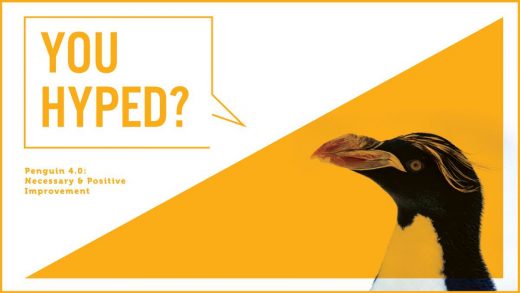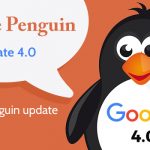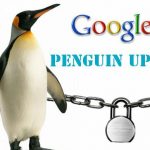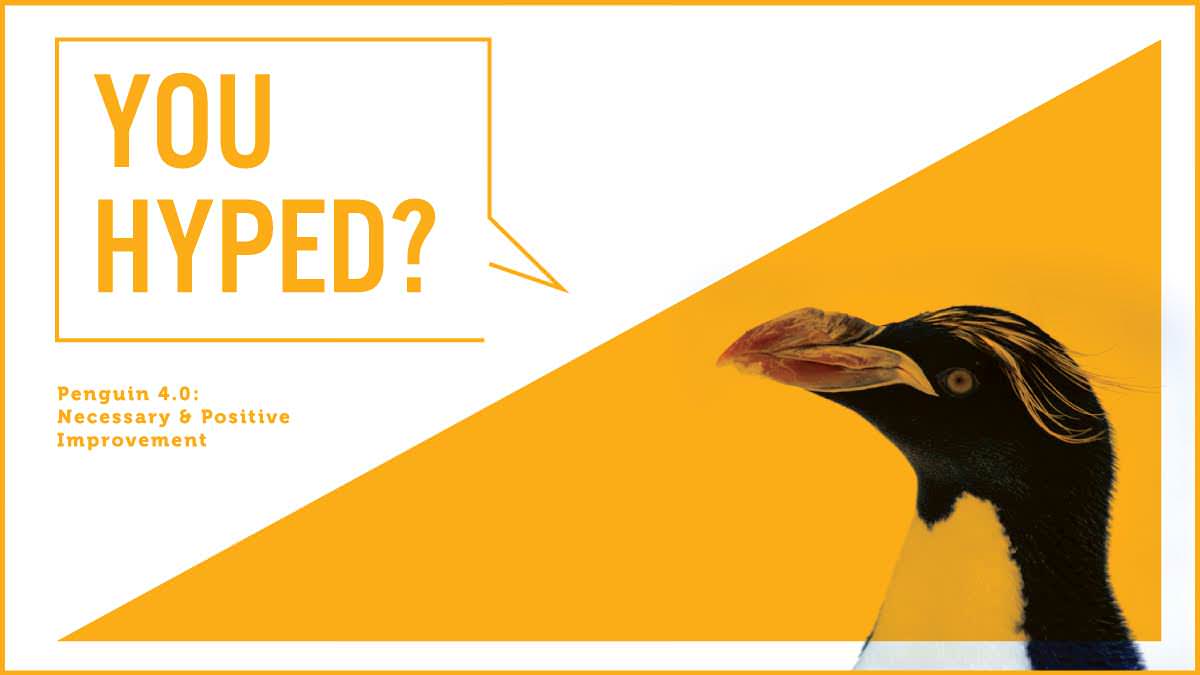Penguin 4.0: Necessary and positive improvement
Are you excited about the recent Penguin update? You should be! Columnist Andrew Dennis explains why this algorithm adjustment is a boon to webmasters and SEOs.

Penguin 4.0 was announced on September 23, and I couldn’t be more excited. I believe Penguin 4 will be a boon for (legitimate) SEO companies everywhere.
We had to wait over 700 days for the newest iteration of Penguin; it was a long time coming, but now that it’s here, it’s more than I hoped. There a few reasons I welcome this new Penguin with open arms:
- The algorithm now devalues links rather than punishing sites.
- Penguin is baked into Google’s core algorithm, updating in real time.
- The feasibility of negative SEO is greatly diminished.
- The new Penguin is more granular.
- Penguin 4.0 pushes SEO closer to real marketing.
Penguin 4.0 is the relief many sites have waited over two years for. As an SEO, I’ve never anticipated an algorithm update as much.
Note: Non-graph embedded tweets are paraphrased quotes from a conversation between Google Webmaster Trends Analyst Gary Illyes and Eric Enge of Stone Temple Consulting at Pubcon 2016 in Las Vegas.
The algorithm now devalues links rather than punishing sites
This new version of Penguin devalues spam links rather than penalizing entire sites.
Gary Illyes expanded on this new Penguin fact in a Facebook conversation with Barry Schwartz, which he covered here on Search Engine Land. Illyes stated:
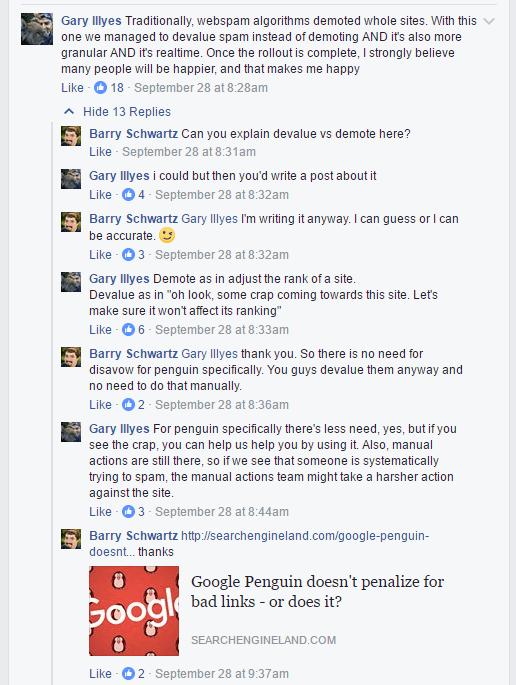
This is a key distinction, and one that I am very happy about.
When Penguin first launched, it was punitive by nature. If your site was affected by Penguin, your entire site was demoted in search — without clear explanation or instruction as to how to recover. The harshness of Penguin, combined with the misinformation surrounding the algorithm, created a negative environment and contentious relationships between business owners and Google.
Penguin 4.0 — and its devalue vs. demotion approach — is a vast upgrade, and it should improve relations between site owners and Google.
Google will still be able to prevent spam from manipulating their results, but now site owners won’t have to live in fear of a crippling Google penalty, with questionable recovery. Manual actions still exist, but these are made by discerning humans who are much better at determining the intent behind links. Manual penalties are also much easier to identify, both in application and in recovery.
I’m optimistic this shift in Penguin will open the web for people to link more freely and openly. In fact, Penguin 4.0 should improve links as a ranking signal.
Penguin is baked into Google’s core algorithm, updating in real time
Penguin 4.0 is now baked into Google’s core algorithm, and updates in real time.
With this change, Penguin’s data is refreshed in real time, so changes will be visible much faster, typically taking effect shortly after we recrawl and reindex a page.
With the move to Penguin 4.0, Google will be able to assess links much more quickly.
This means no more waiting for Penguin refreshes or updates in order to recover. (Sites demoted by Penguin waited over 700 days for this latest update!) In fact, Google stated in their announcement that they won’t comment on any future refreshes.
This is great news, and it should relieve more of the fear, misinformation and uncertainty surrounding Penguin. I can’t imagine how difficult it was for site owners to keep a website alive while demoted by Penguin for over a year and a half.
Now that Penguin 4.0 is real time, site owners are no longer at the mercy of Google’s Penguin refreshes, which happened infrequently at best. This is particularly beneficial to SEOs, as competitors outranking our clients via spam will now be devalued in real time.
Of course, Penguin 4.0 won’t help everyone:
But if you’ve been securing real, worthwhile links, you should start to see signs of recovery.
The fact that Google can evaluate links much faster also mitigates the efficacy of negative SEO.
The feasibility of negative SEO (NSEO) is greatly diminished
Penguin 4.0 should help end negative SEO problems.
Although Google continues to deny NSEO, I personally find it hard to believe there were no instances of it affecting a site.
Either way, Penguin 4.0 should alleviate many concerns over negative SEO.
The goal of NSEO was to have your competitor penalized, which is no longer possible, since Penguin won’t demote entire sites.
Of course, manual actions are still possible. But according to Illyes, there isn’t any “trigger” you could trip with negative SEO that would flag a site for manual review.
All of these factors mean NSEO should no longer be a feasible strategy for beating your competition. Penguin 4.0 should encourage site owners and SEOs to focus on optimizing and promoting their own sites, rather than tearing down competitors.
The new Penguin is more granular
This new iteration of Penguin is much more granular than previous versions.
Penguin now devalues spam by adjusting ranking based on spam signals, rather than affecting ranking of the whole site.
This is another significant improvement for Penguin. Rather than devaluing an entire site, Penguin can now pinpoint spammy links and devalue them at the page level.
Gary Illyes also explained in a recent podcast on Marketing Land that Google adds labels to links. The example labels Illyes provided were:
- footer;
- in-content;
- Penguin real-time; and
- disavowed.
The fact that Google’s link evaluation is more sophisticated is good news for SEOs and the web community as a whole. If Google continues to be more granular and refined in devaluing manipulation, then real, hard-to-earn links de facto become more valuable.
Penguin levels the playing field and rewards the best marketers.
Penguin 4.0 pushes SEO closer to real marketing
The improvements made to Penguin 4.0 provide more immediate rewards for legitimate practices because spam is devalued more efficiently. This shift will push the SEO industry as a whole toward real strategies, and away from manipulation.
Of course, many successful and respected SEOs are already involved in real marketing. However, there are also many shady individuals and companies that claim to be SEOs while providing spammy services.
Penguin 4.0 is another nail in the coffin for these unscrupulous agencies, and that’s good for the SEO industry as whole.
Sites propped up by spam will be devalued, providing gains for those who secure links the right way.
Also, if you’ve been dealing with issues from Penguin 3 — and have been working in earnest to correct these issues — you should start seeing signs of recovery. In fact, notable SEOs have already been sharing some nice recovery stories.
Glenn Gabe has shared impressive examples of recovery:
As did Marie Haynes:
We’ve also seen positive movement for some of our Penguin-affected clients at Page One Power:

Penguin 4.0 is continuing the trend that the original Penguin release began: eliminating the noise of link spam and allowing real, value-driven links to shine through.
As spammy, manipulative practices become less and less effective and die off, the SEO industry as a whole will move to legitimate marketing. Improved practices lead to improved reputation, and I suspect we’ll look back at Penguin 4.0 as a boon for SEO and the health of the web overall.
[Article on Search Engine Land.]
Some opinions expressed in this article may be those of a guest author and not necessarily Marketing Land. Staff authors are listed here.
Marketing Land – Internet Marketing News, Strategies & Tips
(40)

